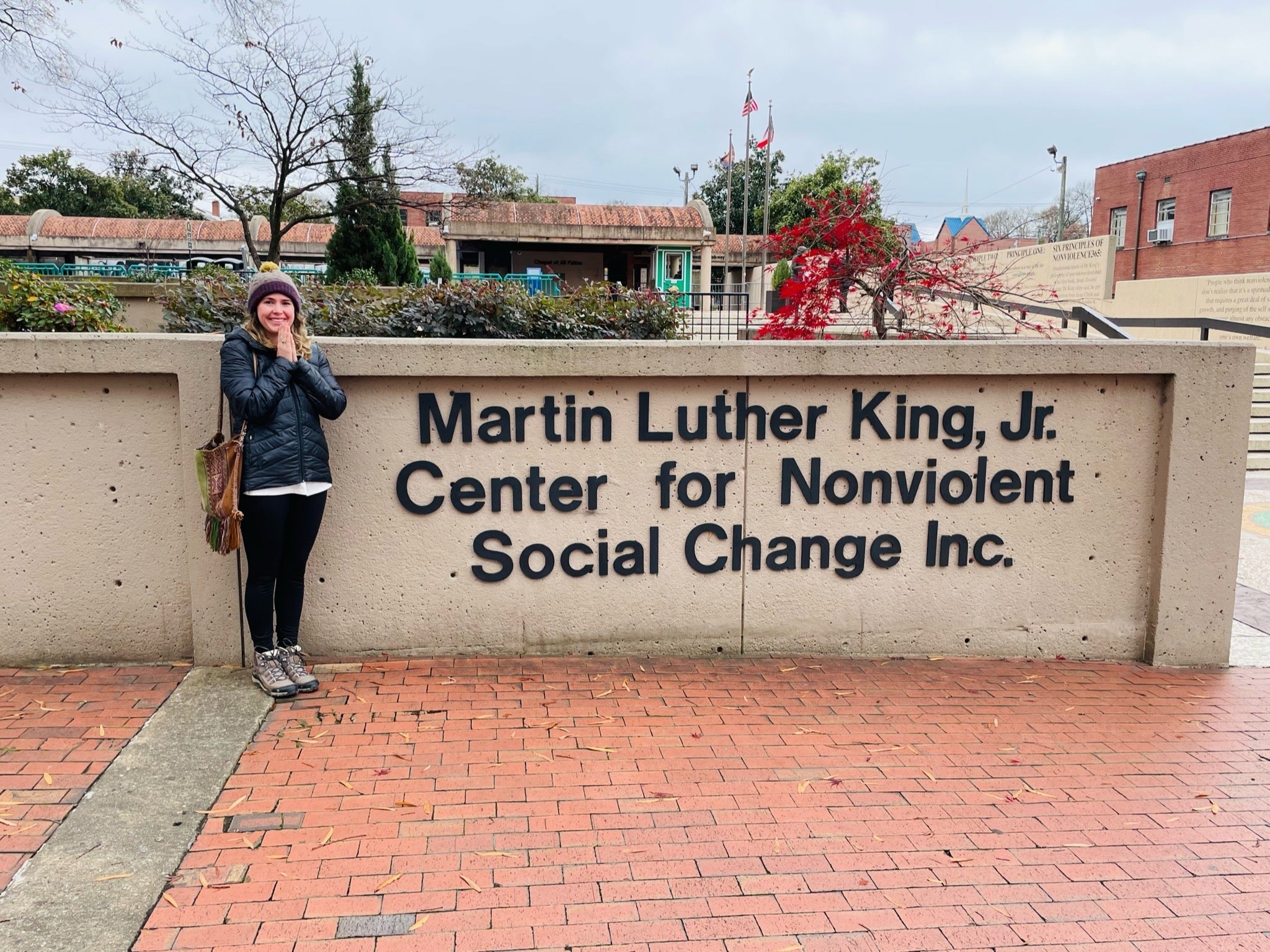
The Guiding Light of Ahimsa: Martin Luther King Jr. & Mahatma Gandhi
“If humanity is to progress, Gandhi is inescapable. He lived, thought, and acted, inspired by the vision of humanity evolving toward a world of peace and harmony. We may ignore him at our own risk.”
In December of 2021, after a family holiday trip had just wrapped up in the Blue Ridge Mountains, I found myself with a few hours to pass before my flight back from Atlanta to Sacramento. As my mind began to envision how I would spend the time, I first thought of observing the underwater worlds at the famous Georgia Aquarium or going for a leisurely stroll through downtown’s Centennial Olympic Park but then I remembered a recent conversation I had with an Atlanta local and they had mentioned the King Historic District. Also known as the Old Fourth Ward neighborhood, this downtown historic district was the home of Dr. Martin Luther King Jr. In this neighborhood sits the home in which Dr. King was born and raised, the Ebenezer Baptist Church where both MLK Jr. and his father preached and the Martin Luther King Jr. National Historic Park which includes The King Center for Nonviolent Social Change, where Dr. King and his wife are laid to rest. Without a doubt, the King Historic District is a fascinating place and contains some of the most important and legendary sites of the civil rights movement. My mind was made up, this was the must-see spot I was going to before my flight back west.

Once I arrived at the King Historic District, I made my way to The King Center for Nonviolent Social Change. Founded in 1968 by Dr. King’s devoted and brilliant wife, Coretta Scott King, the Center shares the legacy and teachings of MLK Jr. and acts as both a local and global resource to empower the next generation of changemakers to work towards an equitable, loving and just society. When you walk through the entrance of the Center, you are met with a quote from Coretta Scott King. It says:
“I had conceived of the Center as an extension of Martin’s personality-not just as a place, not just a building, but a spirit, one unguarded with his philosophy of nonviolence and love in action. It would be the official living memorial, a place where it would teach his philosophy, methodology and strategies of nonviolence in the hope of bringing about social change and eliminating what he called the triple evils of society: poverty, racism and war.”

Also at the entrance of The King Center is a large, long wall where the Six Principles of Nonviolence are written. First outlined in 1958 in Dr. King’s first book, Stride Toward Freedom, the Six Principles of Nonviolence are:
- Nonviolence is a way of life for courageous people.
- Nonviolence seeks to win friendship and understanding.
- Nonviolence seeks to defeat injustice, not people.
- Nonviolence holds that suffering can educate and transform.
- Nonviolence chooses love instead of hate.
- Nonviolence believes that the universe is on the side of justice.
Dr. King conceived of the Six Principles of Nonviolence through his own Christian faith but also through his studies at the seminary school of Mahatma Gandhi. As you might know, Mahatma Gandhi was an Indian lawyer and civil rights leader that utilized the philosophy and methodology of nonviolence (known as ahimsa in Sanskrit) from 1919-1942 during the Indian Independence Movement against British rule. Gandhi called his nonviolent method satyagraha. This Sanskrit term literally translates to ‘holding onto truth’ and is informed by three spiritual tenets- satya (truth & fairness), ahimsa (non-harming/non-violence to the self and others) and tapasya (deep meditation/concentration & patience).
In today’s world, I notice that Mahatma Gandhi's impact on Martin Luther King Jr. and other civil rights leaders across the globe can be overlooked. Yet, what the trip to The King Center drove home for me was that Dr. King and Coretta King never forgot the inspiration that they drew from India and Mahatma Gandhi’s legacy. Gandhi’s tireless work to liberate mother India from imperial rule through embracing love over hate and fear was central to the progress made by the civil rights movement in the United States. Hence, this methodology of nonviolence was crucial to the success of the Montgomery bus boycott which was sparked by the arrest of Rosa Parks in 1955.
In February 1959, Martin Luther King Jr. had the opportunity to embark on a five-week tour of India with his wife, Coretta, and historian, Lawrence Reddick. Although they never had the opportunity to meet Gandhi himself (as Mahatma Gandhi was assassinated in 1948), Dr. King recalls in his account of India (to Ebony Magazine in 1959) that the people of India, including Gandhi’s son, received them warmly and wholeheartedly. Dr. King explains:
“The trip had a great impact upon me personally. It was wonderful to be in Gandhi’s land, to talk with his son, his grandsons, his cousin and other relatives; to share the reminiscences of his close comrades; to visit his ashrama, to see the countless memorials for him and finally to lay a wreath on his entombed ashes at Rajghat. I left India more convinced than ever before that non-violent resistance is the most potent weapon available to oppressed people in their struggle for freedom. It was a marvelous thing to see the amazing results of a nonviolent campaign. The aftermath of hatred and bitterness that usually follows a violent campaign was found nowhere in India. Today a mutual friendship based on complete equality exists between the Indian and British people within the Commonwealth. The way of acquiescence leads to moral and spiritual suicide. The way of violence leads to bitterness in the survivors and brutality in the destroyers. But, the way of non-violence leads to redemption and the creation of the beloved community”.

As we reflect upon the legacy of Dr. Martin Luther King Jr. today, we also pause to honor the beautiful connection between Dr. King and Mahatma Gandhi. Both civil rights leaders embodied love in action during their lifetimes. Their compassion and empathy for all living beings and their efforts toward building a world free from discrimination, oppression, poverty and war will always inspire us to choose love, take non-violent action when we see injustice and do our part to honor the light in our beloved community.
Wishing you a Happy MLK Jr. Day!






Leave a comment
This site is protected by hCaptcha and the hCaptcha Privacy Policy and Terms of Service apply.